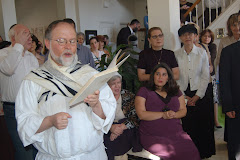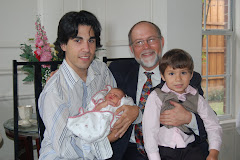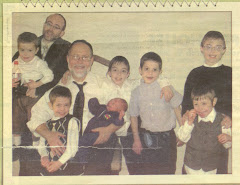The Texas Jewish Post ran this article about Rabbi David Shawel in May 20, 2010. Thank you to Deb Silverthorn for her great work!
Dallas' Rabbi David Shawel has often said that the ritual of a brit milah "is a link in our chain from generation to generation." As this past winter found him providing the blessings and the mitzvah for a second generation, he becomes a more connected part of that chain, I'dor v'dor eem Rabbi Shawel (from generation to generation, with Rabbi Shawel).
On Feb. 25, Rabbi Shawel performed the brit of Micah Lev Joffre, the son of Beryl and Deborah; and just three days later, with the simcha of Purim abounding, he did so for baby Caleb Andrew Gabbai, the son of Joshua and Lindsay. Both are sons of "babies," now grown men, whom Rabbi Shawel had entered into the covenant of Jewish tradition more than two decades previously.
"In both cases, this experience had a bit of deja vu, the families returning to 'this' moment, to the blessings of ma'aseem toveem, of good deeds, for their children," said Rabbi Shawel, who has been a mohel for 32 years, traveling to 21 states and Israel to perform the mitzvah. "I'm appreciative of the passing of time, for the blessing to be here and to still be a part of these families' lives. Twenty-five years have passed and yet I really felt as though I had gone back in time."
"David hasn't changed a bit since we were children; he's the same sweet, kind, gentle soul. I would trust him with my life," said Joffre's mother Linda, a first cousin of Rabbi Shawel's who, at her grandson's brit, reflected on the occasion of her own son's brit, "in my in-laws' living room, just a minute ago." She said, "That we had four generations here, including my father-in-law, Jack, was amazing. As soon as we found out the baby was a boy, Beryl said there was no one else for the occasion."

"A brit in our family wouldn't be complete without David; he was there for me, for my brothers and for almost everyone in the family in the last 30 years," said Beryl Joffre, who lives in Memphis, Tenn. "This was Micah's 'welcoming party,' where he was not only introduced as our son but as a member of the Jewish community. This is the moment that sets him up for life as a Jew. When Rabbi Shawel spoke of how, on the day of a brit, all who are in attendance are freed of sin as though we are all pure, that was something special to me."
"The love Rabbi Shawel has for what he does is extraordinary. You can tell that what he does is meaninful to him," said Dallas resident Joshua Gabbai. "He loves children and he loves to bring them, and his love for Judaism, together. A brit is certainly the first opportunity in a child's life for that to happen and there just isn't anyone but him. He's the guy!"
"I didn't grow up knowing Rab¬bi Shawel but the tradition of his being part of our child's brit, his being the mohel, was important to my husband. He had performed the britot for my sister's son and for those of many of our friends — we knew we could trust him," Lindsay Gabbai said. "In just the first few minutes of meeting with him, we could feel how much he loves what he does. He followed up, checking on both Caleb and us, and I'm so glad he's a part of our lives."
In addition to serving as a mo-hel conducting thousands of britot, Rabbi Shawel, who moved to Dallas with his wife, Goldie, 26 years ago, taught at Akiba Academy and has, for 22 years, worked with Dallas Kosher.
A Newport News, Va. native, Shawel calls his upbringing one where "we were passionately Jewish and my goal has always been to emulate my teachers and rabbonim. They were, and they re-main, my heroes." Until the eighth grade, he attended the Henrietta Kurzer Hebrew Academy, after which he moved to Baltimore to go to the Talmudic Academy and then that city's Ner Israel Rabbini-cal College.
The father of Akiva, Sara, Moshe, Chana and Baruch, who has performed the brit of each of his own sons as well as his grandson (Sara's son) Eliezer Shmuel, Rabbi Shawel stood by proudly as Akiva performed the britot of his own children, Yitzchok Arye and Daniel Simcha Dov. "It's a wonderful ex¬perience, a father's obligation."
As Rabbi Shawel signs each brit certificate, he includes the child's bar mitzvah date at the bottom. "It is the cycle of life, that we wish our sons at the brit that they should grow to have lives of Torah, chup¬pah and ma'aseem toveem," said Rabbi Shawel, who looks forward to the 2023 b'nai mitzvah of Mi¬cah and Caleb. "I feel so fortunate to do the work that I do. If you love what you do, it's never 'work.' From the time I meet 'my babies' I hope they'll be raised with a love for Yid¬dishkeit. To be a rabbi, and to be a part of — truly integrally involved in — the lives of so many families, is such a brachah in my life."

.jpg)
.jpg)
.jpg)
